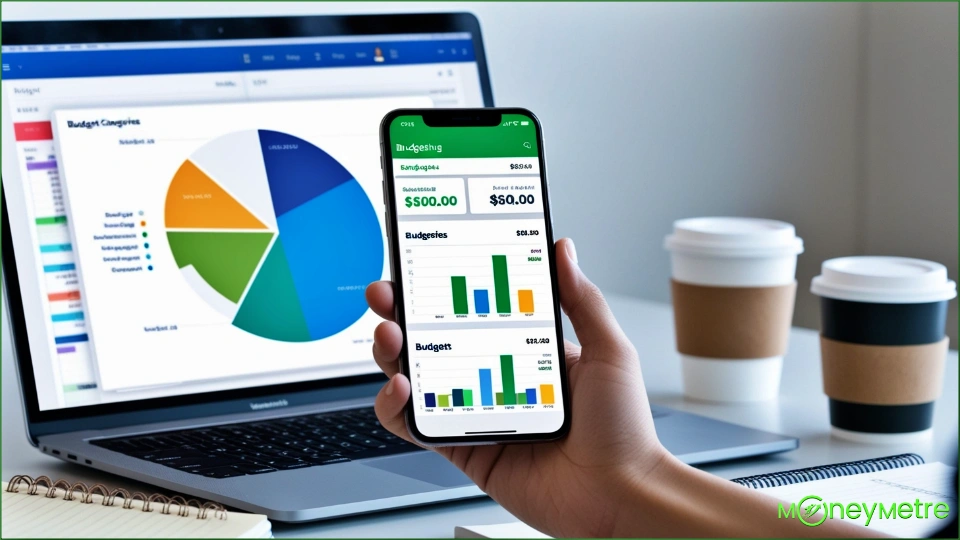Budgeting is essential for everyone, especially college students who often juggle tuition, rent, groceries, and entertainment expenses on limited income or student loans.
For many students, college is the first experience of managing their finances, making it the perfect time to learn smart money habits that can set them up for life. Budgeting apps simplify this process, offering intuitive tools to track spending, set saving goals, and monitor expenses.
In this guide, we’ll dive into the best budgeting apps for college students, showing how they make financial management accessible and effective.
Why Budgeting is Crucial for College Students?
Budgeting is the backbone of financial health. It’s the process of setting spending limits, planning savings, and ensuring that expenses align with income.
For college students, budgeting is critical to avoid debt and save for the future. With the right budgeting practices, students can make informed financial decisions, stretch their money further, and avoid accumulating debt.
What are Budgeting Apps?
Budgeting apps are digital tools that help users track income, expenses, and financial goals. They provide a visual and organized approach to managing finances, making budgeting easier and more accessible.
For college students, budgeting apps offer a mobile, on-the-go solution to track and control spending, eliminating the need for complex spreadsheets or manual calculations.
The best budgeting apps for college students cater specifically to student needs, with features that allow tracking of tuition, rent, and everyday spending.
Why College Students Need Budgeting Apps?
With busy schedules and often unpredictable expenses, college students benefit from budgeting apps to:
- Track Expenses Easily: College life includes many spontaneous costs. Budgeting apps keep all expenses logged in one place.
- Avoid Debt: By tracking finances, students can avoid overspending and unnecessary debt.
- Set Financial Goals: Whether it’s saving for a trip or a future investment, budgeting apps help college students prioritize saving.
- Build Healthy Financial Habits: Budgeting apps make it easy for students to cultivate habits that will help them manage finances beyond college.
12 Best Budgeting Apps for College Students

Here are some top budgeting apps that cater to the unique financial needs of college students. Each app offers various features tailored to managing limited student budgets, tracking expenses, and planning savings.
1. Mint
Mint is a popular budgeting app that automatically categorizes transactions from linked accounts, making budgeting easy. Students can set up personalized budgets, get notifications on upcoming bills, and track spending habits over time.
- Best for: All-in-one financial tracking
- Cost: Free
- Website: Mint
2. YNAB (You Need A Budget)
YNAB helps students allocate every dollar to a specific category, promoting proactive budgeting. It’s ideal for students who want to learn in-depth budgeting skills. YNAB provides reports and financial insights to improve financial awareness.
- Best for: Students looking for a hands-on budgeting approach
- Cost: $14.99/month or $98.99/year (Prices may vary) (Free for students for 12 months)
- Website: YNAB
3. PocketGuard
PocketGuard keeps budgeting simple by showing students how much disposable income they have after bills and savings goals. It’s user-friendly and visually appealing, making it ideal for students new to budgeting.
- Best for: Simple budgeting and expense tracking
- Cost: Free; PocketGuard Plus available for $4.99/month or $34.99/year (Prices may vary)
- Website: PocketGuard
4. Goodbudget
Goodbudget uses an envelope system, allowing students to set aside virtual “envelopes” for various spending categories. It’s straightforward and ideal for students with set monthly expenses.
- Best for: Envelope-based budgeting
- Cost: Free; Premium for $7/month or $60/year (Prices may vary)
- Website: Goodbudget
5. EveryDollar
EveryDollar follows a zero-based budgeting system, helping students assign every dollar a purpose. The app is user-friendly and great for tracking daily expenses, making it a strong choice for students.
- Best for: Zero-based budgeting
- Cost: Free; Plus version for $9.99/month or $99.99/year (Prices may vary)
- Website: EveryDollar
6. Wally
Wally tracks spending and helps students manage their finances across multiple currencies. It’s useful for students studying abroad or those who want to track shared expenses with friends or roommates.
- Best for: Expense tracking with multi-currency support
- Cost: Free; Premium features available in-app
- Website: Wally
7. Splitwise
Splitwise isn’t a full budgeting app, but it’s excellent for tracking shared expenses. Many students share rent, groceries, or bills with roommates, making Splitwise ideal for managing and splitting expenses fairly.
- Best for: Tracking and splitting shared expenses
- Cost: Free; Pro version for $2.99/month (Prices may vary)
- Website: Splitwise
8. Zeta
Zeta is designed for couples but works well for students sharing finances with roommates or partners. It has joint budget management, bill splitting, and shared goal tracking.
- Best for: Shared budgeting
- Cost: Free
- Website: Zeta
9. Simple
Simple helps students manage their finances with a feature that divides funds into “safe-to-spend” categories. It’s a helpful approach for students who want to make sure they don’t overspend.
- Best for: Cash flow management and “safe-to-spend” tracking
- Cost: Free (formerly available; check for updates on comparable apps)
- Website: Currently unavailable
10. Honeydue
Honeydue is also for shared budgeting, allowing students with shared financial responsibilities (like roommates) to track expenses together. It’s a great choice for students wanting transparency on shared bills.
- Best for: Budgeting with transparency
- Cost: Free
- Website: Honeydue
11. Acorns
Acorns rounds up transactions and invests spare change, helping students start investing without effort. It’s a smart option for students interested in starting investments early with minimal funds.
- Best for: Automatic savings and investments
- Cost: $1/month (Prices may vary)
- Website: Acorns
12. Qapital
Qapital makes budgeting fun with “rules” to automate savings, such as rounding up purchases or saving a specific amount whenever a set condition is met. This unique approach helps students save for big expenses or travel.
- Best for: Goal-oriented savings
- Cost: $3/month, with advanced options for $6 or $12/month (Prices may vary)
- Website: Qapital

Conclusion
Budgeting apps have become invaluable tools for college students who want to manage their money effectively. The best budgeting apps for college students are accessible, user-friendly, and capable of transforming financial habits early on.
From Mint’s broad financial tracking to Acorns’ investment round-ups, there’s a solution for every student’s needs. Learning how to use these apps can empower students, giving them the skills to manage money wisely and set up a secure financial future.
FAQs on Best Budgeting Apps for College Students
-
What should I look for in a budgeting app as a college student?
Look for ease of use, relevant features for tracking income, and affordability.
-
Are there any budgeting apps that are free for college students?
Yes, apps like Mint and Zeta are free and offer comprehensive budgeting features ideal for students.
-
Can I link my bank account to these budgeting apps safely?
Most budgeting apps use encryption for secure data handling. Always check app reviews and security features.
-
How can budgeting apps help me avoid debt?
Budgeting apps track spending in real-time, helping you avoid overspending and recognize areas for saving.
-
Is it necessary to pay for a budgeting app?
Not always. Many free apps offer essential budgeting tools. Paid apps often provide extra features.
-
What’s the best budgeting app for students who share expenses?
Splitwise or Zeta is ideal for students who need to split bills and manage shared expenses.
-
Can budgeting apps help me save for a specific goal, like a trip?
Yes, apps like Qapital are goal-oriented and help students save for big expenses like travel.
-
Do budgeting apps replace traditional budgeting methods?
While apps can replace traditional methods, some students still use spreadsheets alongside apps for detailed tracking.
Read Other Latest Posts Below







